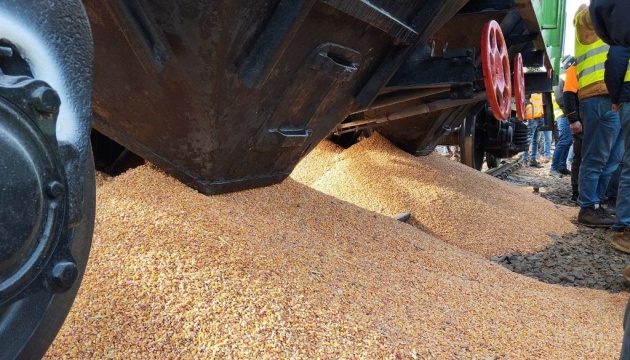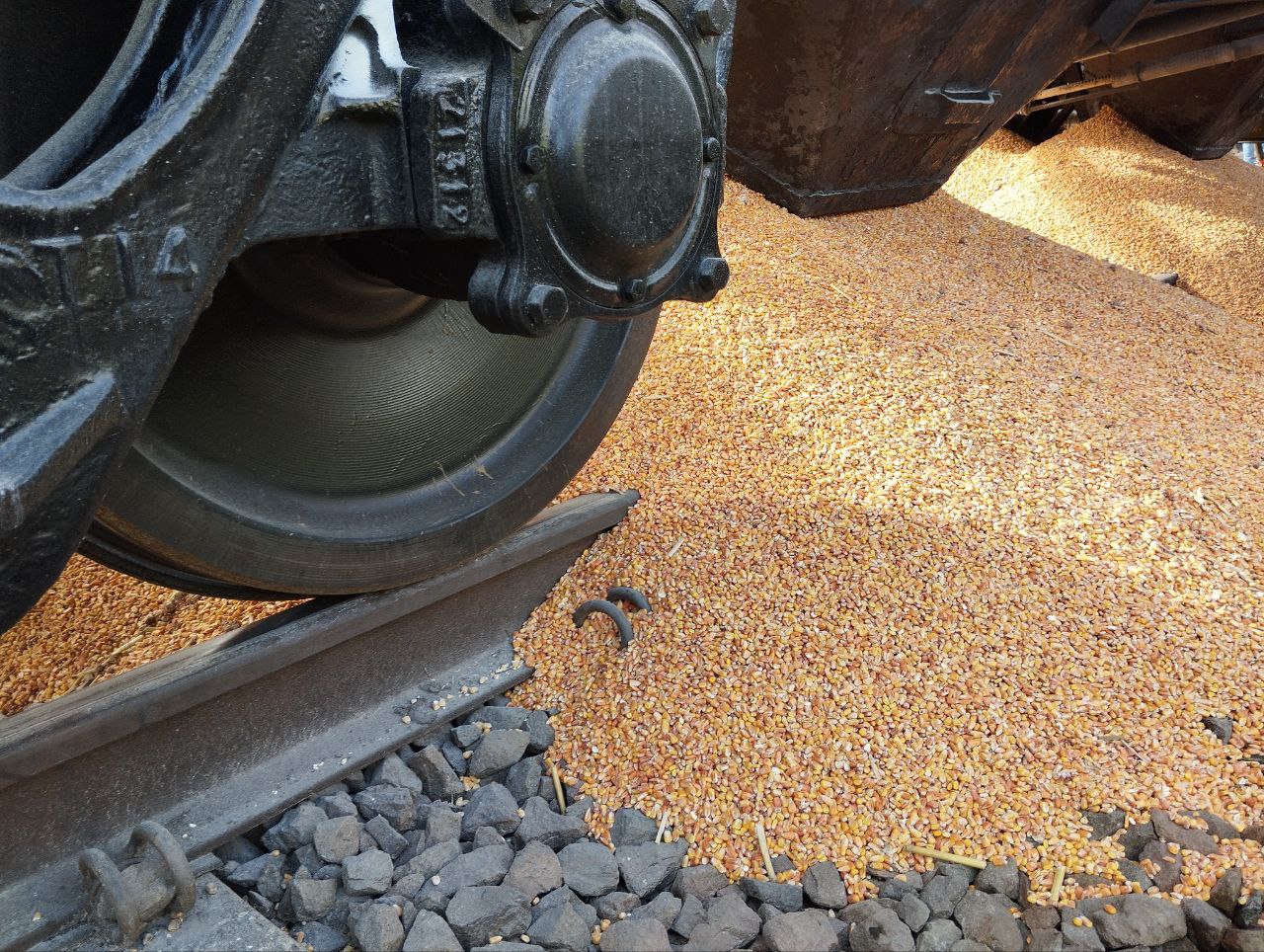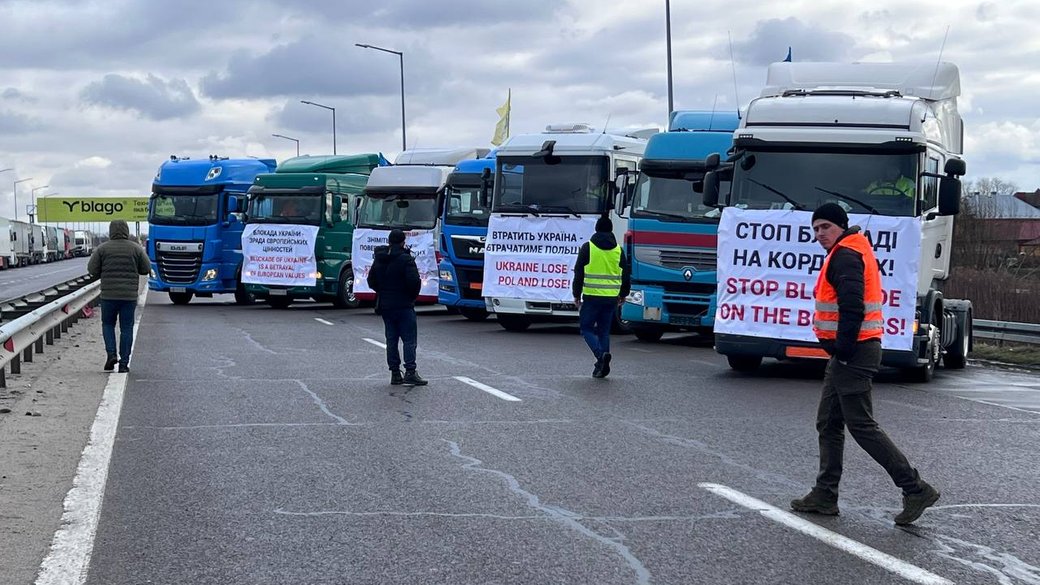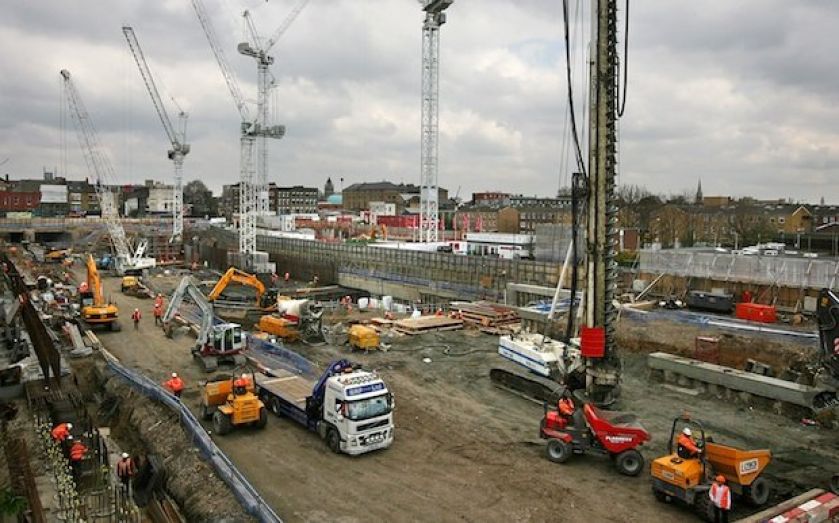Polish farmers block Ukraine border, spill grain, as Ukrainian truckers protest against blockade
Polish farmers escalated border protests over Ukrainian imports, completely blocking trucks at one checkpoint and spilling grain, while Ukrainian truckers initiated counter-blockades against Polish trucks.

On 20 February, Polish farmers protesting against Ukrainian imports escalated their blockade of the Ukrainian border, with truck traffic completely blocked at the Medyka-Shehyni checkpoint, and partially blocked elsewhere. The protesting farmers also spilled the Ukrainian grain at least at one location. Meanwhile, Ukrainian truckers initiated their counter-protest at three Ukrainian checkpoints, blocking Polish trucks until Poland lifts the blockade.
Polish farmers have taken up the baton in blocking the Ukrainian border from Polish truckers, who had recently suspended their two-month-long border blockade. Poland’s farmers have continued to block truck traffic at land crossings to Ukraine. With the Russian naval blockade rendering Ukrainian sea trade nearly impossible, the Polish border blockades complement the Russian embargo, strangling the Ukrainian economy and disrupting supplies into the nation currently defending against Russian aggression.
The Polish farmer organizations announced the expansion of their protests in advance. The demonstrations primarily focus on blockading the Ukrainian border, and targeted 100 locations across Poland on 20 February, including borders, ports, and rail to restrict Ukrainian agricultural imports they say undercut domestic producers.
Polish farmers to expand Ukraine border blockade
Earlier, the website of Poland’s Independent Self-Governing Trade Union of Individual Farmers “Solidarity” announced that the protest would last at least until 10 March.
“On 20 February, as part of a 30-day general strike of farmers, we announce that all protests will be focused on a complete blockade of all border crossings between Poland and Ukraine,” the Solidarity’s statement said.
- On 6 November 2023, Polish carriers began blocking truck traffic at three border crossing points.
- On 23 November 2023, Polish farmers joined the border strikes for a short time, protesting at the Shehyni-Medika checkpoint.
- On 16 January 2024, Polish truckers suspended their blockade on the Polish-Ukrainian border until 1 March.
- On 9 February, Polish farmers started a nationwide strike, resuming the border blockade. The protest is set to continue at least until 10 March.
Ongoing blockade
The Ukraine Border Service reported on Facebook that the Polish protesters blocked all checkpoints near the Ukrainian border:
- As part of the protest of Polish farmers, the movement of trucks through the Medyka-Shehyni checkpoint is completely blocked in both directions, with no timeframe announced for the end of this blockade, according to the Ukrainian Border Service.
- At the Dołhobyczów-Uhryniv checkpoint, protesters announced their intention to block traffic for all types of vehicles until 17:00 on 20 February.
- At the Zosin-Ustyluh checkpoint, from 13:00 to 16:00 Kyiv time, the protesters intended to restrict the movement of buses, trucks, and cars in both directions, promising to let only trucks with humanitarian aid through.
- At the Korczowa-Krakovets checkpoint, the protesters plan to block the movement of all trucks leaving Poland until 21:00 (Kyiv time) on 20 February, except for those carrying critical cargo. At the same time, buses, minibusses, and cars will be able to move freely in both directions.
- At the Hrebenne – Rava-Ruska checkpoint, protesters blocked the movement of all categories of vehicles in both directions, except for those carrying critical cargo and humanitarian aid, starting at 13:00 (Kyiv time) on 20 February.
- At the Dorohusk-Yahodyn checkpoint, the protesters intend to completely block the movement of freight transport in both directions by 19:00 Kyiv time.
Polish protesters spill Ukrainian grain again
On the morning of 20 February, Polish farmers intensified their protests near the Medyka-Shehyni checkpoint, blocking the highway and the railroad. They also scattered grain from a freight car on the tracks, according to Suspilne, whose correspondent reported the developments from the scene.
Suspilne’s video report from Medyka in Poland:
Co-organizer of the protests, Roman Kondrów, leader of the Podkarpackie Deceived Village organization, justified this action, claiming that the farmers are desperate and bankrupt because of the Ukrainian imports, while the organization allegedly has “no influence on people,” according to Suspilne.

The Suspilne correspondent added that the police arrived at the scene after the grain was spilled. In less than half an hour, the Polish farmers unblocked the railroad. After that, they returned to the highway, where they blocked the entrance to the checkpoint.
Poland probes grain dumping by Polish protestors from Ukrainian trucks
In a commentary to Ukrinform, Ambassador of Ukraine to Poland Vasyl Zvarych condemned the spilling of the grain:
“The scattering of corn grain by Polish protesters in Medyka from railcars that were supposed to transit through Poland is another offense that must be prosecuted. We are grateful to the Polish police, who decisively pushed the protesters away from the railroad and managed to prevent further outrages,” Zvarych said.
Ukrainian truckers protesting against the blockade
On February 20, Ukrainian truckers started their protest near the Rava-Ruska – Hrebenne, Krakivets-Korchova, and Shehyni-Medyka checkpoints on the other side of the border, in Ukraine, in response to the Polish blockade of the truck traffic, according to Suspilne.
The protest started at 12:00. The truckers placed posters on their trucks with inscriptions in Ukrainian and English: “Lift the blockade – return Ukrainian drivers home,” “Stop the blockade at the borders,” “If Ukraine loses, Poland will lose,” “The blockade of Ukraine is a betrayal of European values,” etc.
According to Oleh Dubyk, head of the Ukrainian Transport Union in Lviv Oblast, Polish trucks will be allowed into Ukraine with the same delay as Poles allow Ukrainian trucks.

Volodymyr Mykhalevych, head of the NGO International Road Carriers of Ukraine, told Suspilne.Sprotyv that the peaceful protest at the three international checkpoints Rava-Ruska, Krakivets and Shehyni will last from February 20 to March 15 or until the borders are unblocked by Polish protesters.
“Either everyone stops or everyone goes. There can’t be a situation where Ukrainian trucks are stopped, and Polish cars will go. We understand the situation with what they want. But all the demands of the Poles are either to the European Union or to their government, and they have no claims or demands to Ukraine, so this is a very strange situation. The people are very strong, they will stand around the clock,” says Volodymyr Mykhalevych.
Read also:
- Protesters from four more EU countries to join Polish farmers in blocking Ukraine border entry checkpoint
- Polish farmers announce complete blockade of Ukraine border starting 20 February
- Poland probes grain dumping by Polish protestors from Ukrainian trucks
- Polish farmers resume blockade at Medyka-Shenyni, expand to 2 more checkpoints
- Polish farmers block Ukrainian border checkpoint, promise to block another
- Polish truckers end Ukraine border blockade after two-month standoff



